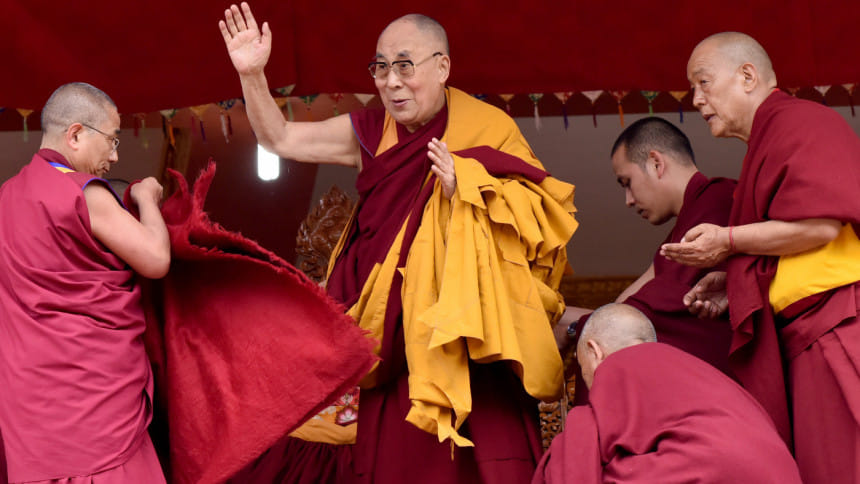The Dalai Lama factor in Sino-Indian relations

Relations between India and China haven't been particularly warm in recent months. But they have lately taken on an icy chill, with Chinese leaders furious over the Dalai Lama's visit to the northeastern Indian state of Arunachal Pradesh, which China claims as its own. On April 8, over loud protests from China's government, the Dalai Lama addressed devotees from far and wide at the historic monastery in the border town of Tawang, where the sixth Dalai Lama was born more than three centuries ago.
India and China view both the Dalai Lama and Arunachal Pradesh very differently. From India's perspective, the Dalai Lama is the spiritual leader of the Tibetan Buddhist community, and so has the right to minister to his followers at the great Tibetan Buddhist monastery in Tawang. And, because Arunachal Pradesh is a state of the Indian union, what happens there is India's decision alone.
In China's view, however, Arunachal Pradesh is not really India's. Yes, it officially belongs to India, but only because of the McMahon line, a boundary drawn by British imperialists in 1911, which China no longer accepts (though China did settle its boundary with Myanmar along the same line). The Chinese government refers to Arunachal Pradesh as South Tibet.
In any case, says China, the Dalai Lama is not a spiritual leader, but a political one. And, given his support for Tibetan self-rule (Chinese officials angrily call him a "splittist"), his visit to a sensitive border area is being viewed as a deliberate provocation.
According to China's spokesman, allowing the Dalai Lama to visit Arunachal Pradesh could harm bilateral relations, with India "facing the consequences." China has also summoned Indian Ambassador Vijay Gokhale to register a formal protest.
India, for its part, has taken a conciliatory approach. The Ministry of External Affairs first attempted to assuage China, stating that "no additional colour should be ascribed to the Dalai Lama's religious and spiritual activities." And, in the face of China's increasingly intemperate fulminations, Prime Minister Narendra Modi's government reiterated its respect for the "One China" policy, urging China's government not to generate "artificial controversies."
But China has not been mollified. Instead, when the Dalai Lama arrived in Arunachal Pradesh, Chinese official media declared that China might be "forced to take tough measures." The Global Times, an English-language tabloid published by the Chinese Communist Party mouthpiece the People's Daily, took a particularly belligerent tone. Citing China's GDP, which is "several times higher than that of India," and its military capabilities, which "can reach the Indian Ocean" – not to mention its proximity to troubled Kashmir – it asked, "if China engages in a geopolitical game with India," who will win?
The same Global Times editorial stressed that this visit by the Dalai Lama to Arunachal Pradesh was different from his previous six – the last of which was in 2009 – because he was "received and accompanied" by India's junior home minister, Kiren Rijiju. India sees nothing unusual in Rijiju, an Arunachali politician, being present for a major spiritual occasion. In democracies, such public events involving popular religious figures are common, and politicians often enjoy the attention they attract by attending them.
But China prefers to use Rijiju's attendance as evidence that the event is, in fact, political, suggesting that India is using the visit as "a diplomatic tool to put pressure on China." The fundamental point, the Global Times stressed, is that the Dalai Lama "is a highly politicised symbol in China's diplomacy," so much so that a country's attitude toward him affects almost "the entire relationship" with China.
Yet surely China must recognise that it has not, in recent years, given India's government much reason to accommodate its sensitivities. In fact, it has responded to Modi's efforts at outreach with a series of insults.
For example, in 2014, Modi not only welcomed Chinese President Xi Jinping to his hometown, Ahmedabad, on his own birthday; on that same trip, he also lifted the previous government's restrictions on Chinese investments in sensitive sectors of the Indian economy, such as ports and telecoms. Chinese soldiers promptly crossed the disputed frontier with India in the Ladakh region of Jammu and Kashmir, going so far as to pitch tents on land that India considers its sovereign territory.
That mini-crisis was followed by a series of policy setbacks that reflected China's scant regard for India's sensitivities on various issues. China opposed India's bid (strongly supported by the United States) for membership in the Nuclear Suppliers Group. It blocked India's request to name Masood Azhar, the head of Jaish-e-Mohammed (a Pakistani terrorist group), to a United Nations Security Council blacklist, despite support for the move from the council's 14 other members.
China has also built a "China-Pakistan economic corridor" through Pakistan-controlled parts of Kashmir. China itself recognises that the territory is disputed, yet its government completely ignored India's objections to the violation of its sovereignty.
Against this background, China's expectation that India will respect its sensitivities is a bit rich. Yet China's arrogant approach is not new. In fact, its reaction to the Dalai Lama's visit to Arunachal Pradesh is of a piece with its behaviour in the South China Sea, where China insists that sovereignty should be determined according to its "nine-dash line."
China expects other countries to fall into line when it makes such a demand, as the Philippines has done under President Rodrigo Duterte. And China has proved willing to turn up the heat on those that don't, such as Japan and Vietnam.
But India is somewhat bigger than China's other regional neighbours, and is made of sterner stuff. Rather than escalate the conflict over the Dalai Lama's visit further, China's leaders should allow passions to subside and relegate the episode to yesterday's news. If they don't, and instead move to follow through on their threats, they may well discover that India, too, has cards to play.
The writer, a former UN under-secretary-general and former Indian Minister of State for External Affairs and Minister of State for Human Resource Development, is currently Chairman of the Parliamentary Standing Committee on External Affairs and an MP for the Indian National Congress.
Copyright: Project Syndicate, 2017.
www.project-syndicate.org
(Exclusive to The Daily Star)

 For all latest news, follow The Daily Star's Google News channel.
For all latest news, follow The Daily Star's Google News channel. 








Comments